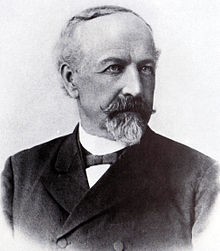Ernst von Herzog References External links Navigation menuGörres - HittorpHathiTrust Digital...
1843 births1911 deathsPeople from Esslingen am NeckarGerman archaeologistsEpigraphersGerman classical philologistsUniversity of Tübingen alumniUniversity of Tübingen faculty
Esslingen am Neckarclassical philologistarchaeologistepigraphytheologyUniversity of TübingenUniversity of MunichParisBerlinGerman Archaeological InstituteRomehabilitationGerman Limes CommissionGallia NarbonensisLimes GermanicusWürttembergRottenburg am NeckarÖhringenMainhardtJagsthausenRoman Constitution

Ernst von Herzog, (ca. 1900)
Ernst von Herzog (23 November 1834, Esslingen am Neckar – 16 November 1911) was a German classical philologist and archaeologist, who as an expert in the field of Roman epigraphy.
He studied theology and classical philology at the University of Tübingen, and afterwards continued his education at the University of Munich. From 1857 he worked as a tutor in Paris, then studied archaeology at Berlin, followed by research at the German Archaeological Institute in Rome. In 1861 he conducted studies of ancient Roman inscriptions in southern France.[1] In 1862 he obtained his habilitation for classical philology at Tübingen, where in 1867 he became an associate professor, followed by a full professorship in classical philology in 1874. Herzog was a prominent member of the Reichs-Limeskommission (German Limes Commission) and of the Römisch-Germanische Kommission des Deutschen Archäologischen Instituts (Roman-Germanic Commission of the German Archaeological Institute).[2]
As a result of his scientific research in France, he published a book on the history of Gallia Narbonensis titled "Galliae narbonensi Commis provinciae Romanae historia descriptio institutorum expositio" (1864).[3] In his studies associated with Limes Germanicus, he conducted archaeological excavations at several sites in Württemberg — Rottenburg am Neckar (1883–84), near Öhringen (1892), and Mainhardt and Jagsthausen (1893).[1]
He was the author of a well-received work on the history and structure of the Roman Constitution, titled "Geschichte und system der Römischen Staatsverfassung" (2 volumes; 1884, 1891). In 1871 he published "Untersuchungen über die bildungsgeschichte der griechischen und lateinischen sprache" (Studies on the educational history of Greek and Latin languages).[3]
References
^ ab Statement(s) based on translated text from an equivalent article at the German Wikipedia; source listed as "Ernst Herzog" by Peter Goessler In: Württembergische Vierteljahrshefte for Regional History. 41, 1935, pp 128-171.
^ Görres - Hittorp edited by Rudolf Vierhaus
^ ab HathiTrust Digital Library published works
External links
- Archaeologia Aeliana, Or, Miscellaneous Tracts Relating to Antiquity, Volume 9